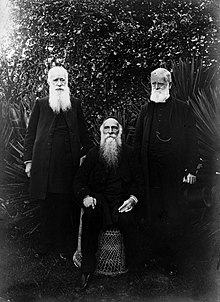William Cowie
| William Cowie | |
|---|---|

Bishop Cowie (seated) flanked by Leonard Williams (left) and Samuel Williams
|
|
| Born |
8 January 1831 London |
| Died | 26 June 1902 (aged 71) Wellington, New Zealand |
| Nationality | New Zealand |
| Alma mater | Trinity Hall, Cambridge |
| Occupation | bishop |
William Garden Cowie (8 January 1831 – 26 June 1902) was bishop of the Anglican Diocese of Auckland, New Zealand, from 1870 to 1902. Although he succeeded George Selwyn in having jurisdiction in this portion of New Zealand, he was the first bishop to be known specifically as Bishop of Auckland. His wife Eliza Jane Cowie (1835-1902) was a distinguished religious worker in her own right, and Bishop Cowie's journals refer frequently to her work with him.
Cowie was born in London, to Alexander Cowie and his wife Elizabeth Garden, daughter of Alexander Garden. His father was from Auchterless, Aberdeenshire, in which county he grew up. Educated at Eton College and Trinity Hall, Cambridge, where he received his BA in 1855 and MA in 1865.
He was admitted deacon in 1854 by the Bishop of Ely, and licensed to the curacy of St Clement's, Cambridge. Ordained priest in 1855, also by the Bishop of Ely, he accepted the curacy of Moulton, Suffolk. Two years later, in 1857, he was appointed chaplain to the Forces in India, and served with Sir Colin Campbell's army at the capture of Lucknow in 1858, for which he received the Indian Mutiny Medal and clasp. In the following years, he was present at the battles of Allygunge, Rooyah, and Bareilly, and served in the Afghan campaign of 1863. Later that year he was chaplain to the camp of the Viceroy of India and in 1864 served as resident and examining chaplain to Bishop Cotton, Metropolitan of India. After a spell as chaplain at Kashmir in 1865, he returned home to an appointment as rector of Stafford in 1867.
...
Wikipedia
